Members Article
This fascinating account has been transcribed word for word from the diaries of Edward Addison. We previously met Edward in our conversations with his brother Reginald and his niece Joan. I have added some pictures some of which have come from Reginald’s collection of his brothers photographs
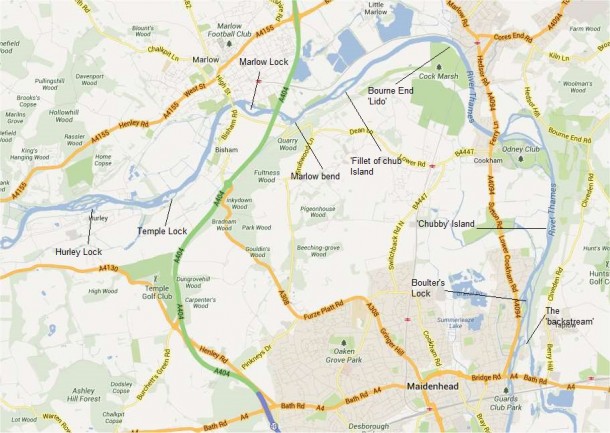
1940 August 4th
The war curtailed holidays this year – with invasion expected anytime it was inadvisable to go away far and for any length of time. It therefore provided an opportunity to do what I’ve often wanted to – go for a trip up the river. Dennis Smith had a week at the same time, so we went down to Maidenhead to get a camping punt.
Being August bank holiday week (although officially cancelled) they were well booked up, but the boatman said he had one coming back at 8 o’clock, which we decided to take. We therefore went up into the town and did some shopping, coming back well loaded, but had to hang about until 9 before the boat came in. It was then early dusk but we pushed off up to the weir stream by Boulter’s Lock, being stopped on the way by the LDV River Patrol boat which ‘took down our particulars’.

This morning we woke at 6, and I put a rod over the side for a few swims down, all I had was a 6” roach, and we did no better when we moored across stream and fished it down properly. Then we discovered the punt was a leaky one, which would have meant a week of bailing out morning and night, so after breakfast we took it back. He had another coming in at mid-day, but ‘to make sure’ advised us to go up the back water behind the island opposite and fish till about 1 o’clock. We accordingly went up there and found a deep hole by some piles where we moored.
Looking down into the clear water I saw several perch and a few fair sized roach cruising about and although there were thousands of minnows I caught one and Dennis put it on and dropped over. Straight away off went the float and up came a 7” perch. We took it in turns and had quite a few, then decided to go back and see if the boat had arrived. It had not, so we crossed the river again and moored up by the island watching the fish which came in under the boat especially a chub which returned time after time but did not look at a piece of paste thrown in.
Then I caught some minnows and cast into a hole among the weeds, so for an hour or two we had good spot catching perch, but all ran small 6 – 7”. The boat finally arrived at 8 pm, so we only had time to get up to the lock again; we fished for half an hour but did not get anything beyond a bleak or two.
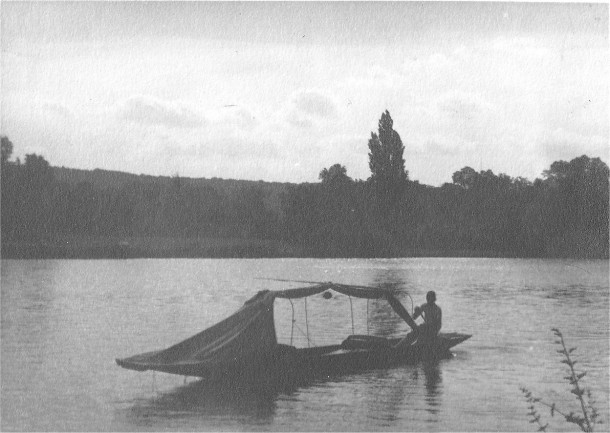
1940 August 5th
Fished next morning along the same reach in the fast water of the weir stream, but fish remarkable for their absence except one or two small roach, and some good rises in the centre of the river. We accordingly had breakfast after an hour and went up through Boulter’s Lock (favourite stamping ground of the Thames) into the Cliveden reach, which on a normal bank holiday Monday would have been full of craft; as it was, we had it almost to ourselves.
A big island half a mile up was bordered by some very ‘chubby’ looking swims, but several swims down under the trees failed to bring a bite. We moored at the top of the island on the left going up, where there was a fine swim 7ft deep with no weed. We fished for a couple of hours, during which Dennis caught a nice chub of 12”, other fish seemed absent except for bleak, although I had one or two small dace and a gudgeon.
The water was very clear and the day windless, so roach fishing was rather hopeless. To provide a bit of excitement we suddenly heard air-raid sirens start up, but the ‘all clear’ went first so we decided that it was probably a test, and did not stop fishing. It heightened our perceptions for the sky immediately seemed full of planes, which must have been coming and going all the time, unnoticed by us.
We then travelled up through Cookham (where Dennis shopped), and then the river widened out and a headwind became noticeable as we approached Bourne End in the evening. This place we decided was a ‘dump’ hundreds of people were crossing the ferry and round the bend we discovered the reason – a large bay about 4 – 5 ft which the locals used as a lido; hundreds of people were bathing and paddling. The wind made it hard work along this stretch but we got past as quickly as we could and finally pulled in to the bank just before the next island.
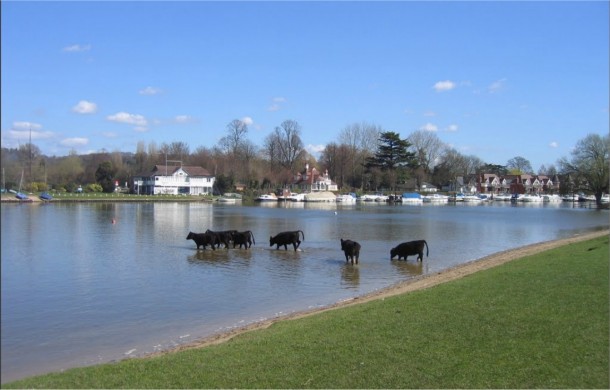
For supper we had the semi-cooked lamb chops which I bought. The outside was beginning to smell a bit, but we decided we could not threw it away after carrying it that distance, so cut off a slice and cooked the remainder. It tasted alright and we had no ill effects; probably the outside was a bit off. Preparations took some time and it was too late to do any fishing after supper.
1940 August 6th
Next morning we went up the left hand side of the island, but found it very weedy and near the bank full of snags. We fished one clear swim on the bank side and began getting bites, but they were mostly bleak, with a few small roach. It seemed hopeless after an hour so we landed on the island and had breakfast – one rasher of bacon and a fillet of chub each. The latter was all what the books have said – like cotton wool stuffed with bones; it was very soft and tasteless.
Above the island there were some beds of rushes with clear swims at the side, so we moved here and fished, although it was hot and sunny mid-day by then. We failed to get anything except bleak in the clear water (bottom visible in 6 – 7 ft), until I put on a worm and immediately began getting perch.
We both had quite a lot until we used up the worms, when we packed up and moved up to just below Marlow where there was a big weedy bend in the river. Here we saw minnows jumping and had a cast with the few remaining worms into clear holes among the weeds. Result; 3 perch in three casts. We eventually took to catching minnows and with them perch. Everywhere we cast there were fish, but none longer than 6 – 7”.
When we were tired of this we visited Marlow for shopping and then paddled off up through Temple Lock and Hurley Lock. The reach between these two looked strange and foreign as one might expect a backwater of the Amazon. The bank was overhung with dark trees (Rhododendron and Yews) and the almost still water covered with scum.
Not a fish rose anywhere. Above the lock it was different again and we moored half a mile up, fishing for half an hour (laying on)and getting a couple of sizeable roach. Our hearts were gladdened by the splashes of jumping fish and we decide to make a morning of it next day
1940 Aug 7th
Accordingly we were about at 7, and crossed over to moor one end of the punt to an overhanging tree. The bottom was found 12 – 13 ft below us and a fair stream was running round this bend. Dennis after a few casts had a nice roach, 11” and another 10½” later, but I could not get one and he had hardly any more bites. It seemed extraordinary just to catch these two in such an apparently good swim, but there it was. I even tried a large green caterpillar and had a bite at which I struck and missed.
After breakfast we tried along under the trees, but no chub were about and we eventually fell to perch fishing again as the sun came out hot. We got them as fast as we could catch minnows, but all ran the same size.
There was a big clump of rushes some ten yards from the bank and we pushed up and dropped a line in with a minnow just beside it, as it travelled down, it sank. I struck and said ‘here’s a good one’, then the line came in and I found the hook bitten off. It did not take long to rig up pike tackle and Dennis caught a bleak, which was lip hooked and cast into the hole, the float soon bobbed and was jerked under several times in a manner which suggested a small pike; it soon left it and when I brought it in there were teeth marks along each side.
The bleak seemed to have deserted us, but after a few minutes we got another and cast it in hopefully. Almost instantaneously the float disappeared and a lot of line ran off; it just went deeper and deeper, so giving it a few more seconds I struck – empty! Could we catch another bleak? We tried and tried but had to give up, so went back and had supper.
For the last hour we fished in the same swim as this morning, but had hardly a bite and Dennis got just one or two roach. We were soon to find the reason. Just before dark someone came along the bank about 10 yards down and began scattering handfuls of hemp. We were unfortunately a few yards above someone’s private baited swim.
1940 Aug 8th
Next morning we decided to have another go for the pike, so went up and fished for some livebait in the weed holes. We had a number of roach but all about 7” as well as some bleak and a small dace, all of which were dropped into Mr Pike’s lair, but he was not hungry. We went all round the rush bed and then off to breakfast, which seemed to take longer than usual before we were satisfied.
A look at my watch explained why – it was 12 o’clock, when we thought it about 10. We had to start off downstream again then, but thought we would try any likely swims on the way. It looked promising a little way down where the towpath is lined with rushes, but a strong wind had developed and we were and we were unable to keep the punt moored, so gave it up.
Just below Hurley park we tried round the weed beds out of the wind, I had a number of perch on worms which we dug on the island. It looks very pikey round here
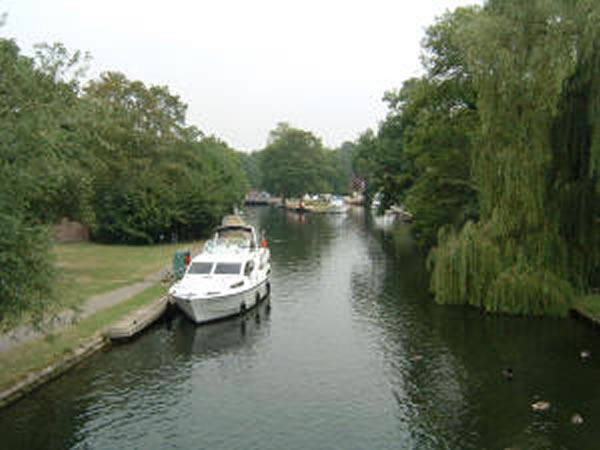
The following wind helped us along, but blew hard all the evening. We moored below Marlow lock just behind a gravel bar which protected the entrance to a backwater. There was a hole here and perch kept chasing minnows right in to the edge. They refused to look at a worm, except one, about 5”. There were some terrific splashes as fish jumped off the point of the island.
1940 Aug 9th
I woke at 7 next morning, but Dennis slept on, so did not wake him. Looking over the side of the boat, where the water was a couple of feet deep and sloped away like a bowl, I saw a big gudgeon, then some good sized roach. This looked interesting, as I reached for a piece of paste and dropped some pellets in they did not show the slightest interest.
When Dennis woke they were still about and one came and picked up one of the bits of paste on the bottom. I then got a cast off the winder and baited it with paste, hand lining. Over the side it went and just reached the bottom when a good fish came in and took it. It was a dace about 8” long, this was promising and I got my rod and poked it out, laying on and soon had a roach about the same size.
These were two fish caught almost under the boat, close in to the bank and we had been trying to find them all over the river! Had a few gudgeon, mostly small, then we had breakfast and went down the backwater. It reminded me of Penton Hook but was deeper and not quite as wide, the punt broadside on would have blocked it.
We moored against the bank just before it widened out and curved round into the main stream and there must have been a hole here full of perch, for we had them practically every cast. They were all about 7” except for two – Dennis lost one about 8”and I caught one about the same size – more by luck than judgement, for I began fishing with bread cubes and as the line came up at the end of a swim a perch was following the piece of bread. I stopped it on the surface in surprise; the fish stopped too; then directly I moved the line again it turned and snapped at the moving bread cube!
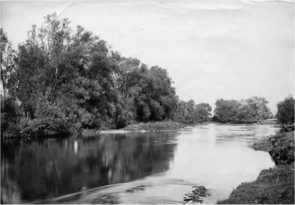 |
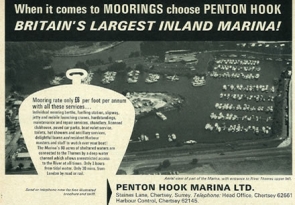 |
|
Penton Hook as it would have been in the 1940’s and an advert for the marina that opened in 1973
|
|
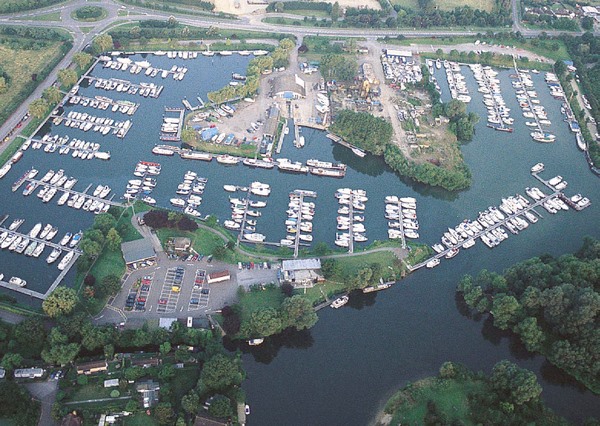
Dennis also hooked a chub of about 12” but on the way in it made a dash round a piece of weed and broke the gut cast. After about an hour we both hooked perch and lost them, which scared the others and they all went off; mine was another about 8 – 9”, which just came to view.
We then went to try the river below the backwater where we had a good catch on the way up, but they were not feeding as well this time. We saw a large shoal of roach and dace, which refused to be scared by a float plopping amongst them or the punt swinging over them, but also would not look at paste or bread cubes thrown in. Hemp might have attracted them, but we had none.
We wanted to get back to the swim above Boulter’s lock, so had a long pull before us. Fortunately the wind was with us and we hoisted the canvas for a sail, but found we lost all we had gained on getting round the bend below Bourne End. Here the wind was in our faces and blew very heavily from the exposed bank; it was very hard indeed to pull up to Cookham, but once through the lock the overhung bank gave some protection. We arrived at the island at last, but after cooking our meal it was too late for much fishing; I had 20 minutes or so and hooked one roach, but they did not seem to be feeding.
1940 Aug 10thNext morning was still very windy and started with occasional spits of drizzle, but cleared after breakfast. We tried to fish our swim at the top of the island but the punt blew off its mark, so we tried some others on the sheltered side. Here, however there was hardly any stream and no fish except bleak.
We persevered though and I at last found them at the foot of the island just out of the wind, where there was a fair flow of water. After that we kept catching them, but there was little over 7 – 8”. It was better sport than we were used to having though. The change in the weather from the hot and windless days was evidently responsible. From a fishing point of view it was a pity that it had come so late, but we could not really complain about such a glorious week.
Our next article will cover the events from a month later when Reginald is joined by his brother Ted (who is on leave from the forces). They spend a week together on the Thames a little further upstream from this trip.
Text reproduced from the diaries of Reginald Addison by kind permission of Ted and Joan Addison.




